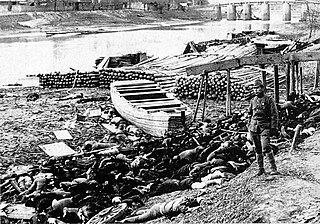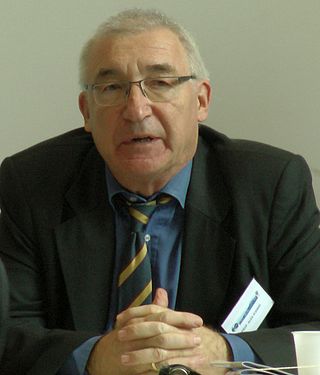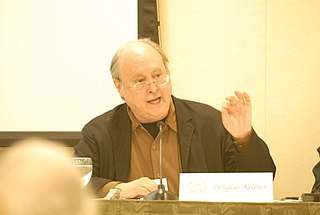
State terrorism refers to acts of terrorism which a state conducts against another state or against its own citizens.

Terrorism, in its broadest sense, is the use of intentional violence and fear to achieve political or ideological aims. The term is used in this regard primarily to refer to intentional violence during peacetime or in the context of war against non-combatants. There are various different definitions of terrorism, with no universal agreement about it.
Religious terrorism is a type of religious violence where terrorism is used as a strategy to achieve certain religious goals or which are influenced by religious beliefs and/or identity.
Christian terrorism, a form of religious terrorism, comprises terrorist acts which are committed by groups or individuals who profess Christian motivations or goals. Christian terrorists justify their violent tactics through their interpretation of the Bible and Christianity, in accordance with their own objectives and worldview.
A lone wolf attack, or lone actor attack, is a particular kind of mass murder, committed in a public setting by an individual who plans and commits the act on their own. In the United States, such attacks are usually committed with firearms. In other countries, knives are sometimes used to commit mass stabbings. Although definitions vary, most databases require a minimum of four victims for the event to be considered a mass murder.
Henry Armand Giroux is an American-Canadian scholar and cultural critic. One of the founding theorists of critical pedagogy in the United States, he is best known for his pioneering work in public pedagogy, cultural studies, youth studies, higher education, media studies, and critical theory. In 2002 Routledge named Giroux as one of the top fifty educational thinkers of the modern period.

Religious violence covers phenomena in which religion is either the subject or the object of violent behavior. All the religions of the world contain narratives, symbols, and metaphors of violence and war. Religious violence is violence that is motivated by, or in reaction to, religious precepts, texts, or the doctrines of a target or an attacker. It includes violence against religious institutions, people, objects, or events. Religious violence does not exclusively include acts which are committed by religious groups, instead, it includes acts which are committed against religious groups.
Mia M. Bloom is a Canadian academic, author, and Professor of Communication at Georgia State University. She was formerly an associate Professor of International Studies at the Pennsylvania State University in University Park and a fellow at the International Center for the Study of Terrorism at Penn State.
Khaled Abou el Fadl is the Omar and Azmeralda Alfi Distinguished Professor of Law at the UCLA School of Law where he has taught courses on International Human Rights, Islamic jurisprudence, National Security Law, Law and Terrorism, Islam and Human Rights, Political Asylum, and Political Crimes and Legal Systems. He is also the founder of the Usuli Institute, a non-profit public charity dedicated to research and education to promote humanistic interpretations of Islam, as well as the Chair of the Islamic Studies Program at the University of California, Los Angeles. He has lectured on and taught Islamic law in the United States and Europe in academic and non-academic environments since approximately 1990.
Jewish extremist terrorism is terrorism, including religious terrorism, committed by extremists within Judaism.

Alex Peter Schmid is a scholar in terrorism studies, who from 1999 to 2005 was Officer-in-Charge of the Terrorism Prevention Branch of the United Nations Office on Drugs and Crime in Vienna. He is particularly known for his work on the definition of terrorism.

Communal violence is a form of violence that is perpetrated across ethnic or communal lines, where the violent parties feel solidarity for their respective groups and victims are chosen based upon group membership. The term includes conflicts, riots and other forms of violence between communities of different religious faith or ethnic origins.

Douglas Kellner is an American academic who works at the intersection of "third-generation" critical theory in the tradition of the Frankfurt Institute for Social Research, or Frankfurt School, and in cultural studies in the tradition of the Birmingham Centre for Contemporary Cultural Studies, or the "Birmingham School". He has argued that these two conflicting philosophies are in fact compatible. He is currently the George Kneller Chair in the Philosophy of Education in the Graduate School of Education and Information Studies at the University of California, Los Angeles.
Communist terrorism is terrorism perpetrated by individuals or groups which adhere to communism and ideologies related to it, such as Marxism–Leninism, Maoism, and Trotskyism. Historically, communist terrorism has sometimes taken the form of state-sponsored terrorism, supported by communist nations such as the Soviet Union, China, North Korea and Kampuchea. In addition, non-state actors such as the Red Brigades, the Front Line and the Red Army Faction have also engaged in communist terrorism. These groups hope to inspire the masses to rise up and start a revolution to overthrow existing political and economic systems. This form of terrorism can sometimes be called red terrorism or left-wing terrorism.
Critical terrorism studies (CTS) applies a critical theory approach rooted in counter-hegemonic and politically progressive critical theory to the study of terrorism. With links to the Frankfurt School of critical theory and the Aberystwyth School of critical security studies, CTS seeks to understand terrorism as a social construction, or a label, that is applied to certain violent acts through a range of political, legal and academic processes. It also seeks to understand and critique dominant forms of counter-terrorism.
Sherifa D. Zuhur is an academic and national security scholar of the Middle East and Islamic world. She was most recently a visiting scholar at the Center for Middle East Studies, University of California, Berkeley and is the director of the Institute of Middle Eastern, Islamic and Strategic Studies.
Jeffrey Kaplan is an American academic who has written and edited a number of books on racism, religious violence, terrorism and the far-right. He is an associate professor of religion at the University of Wisconsin–Oshkosh and a member of the board of academic advisors of the university's Institute for the Study of Religion, Violence and Memory.
In ethics, questions regarding the morality of violence ask under what conditions, if any, the use of violence can be morally justified. Three prominent views on the morality of violence are (1) the pacifist position, which states that violence is always immoral, and should never be used; (2) the utilitarian position, that means that violence can be used if it achieves a greater “good" for society; (3) a hybrid of these two views which both looks at what good comes from the use of violence, while also examining the types of violence used.

Virginia Potter Held is an American moral, social/political and feminist philosopher whose work on the ethics of care sparked significant research into the ethical dimensions of providing care for others and critiques of the traditional roles of women in society.
Terrorism and Political Violence is a peer-reviewed academic journal covering terrorism and counter-terrorism published by Routledge. It was established in 1989 by David C. Rapoport, who remains editor-in-chief. In the editorial manifesto in its first issue, it is referred to as the Journal of Terrorism Research; however, from its first issue until the present, in editorial statements and elsewhere, it is only ever cited as Terrorism and Political Violence.






